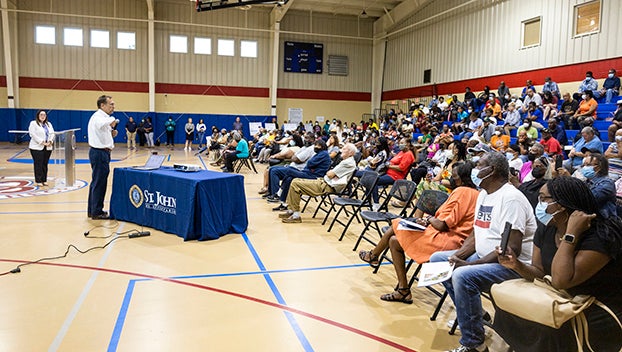Financial assistance available for Hurricane Ida repairs
Published 2:55 pm Tuesday, July 5, 2022

- Pat Forbes speaks before a packed gymnasium in Reserve during a public hearing on hurricane recovery funding and assistance.
|
Getting your Trinity Audio player ready...
|
LAPLACE — Financial assistance with home repairs and potential reimbursement options are still available for survivors of Hurricane Ida who sustained severe property damage.
Last week, St. John the Baptist Parish President Jaclyn Hotard joined Pat Forbes, executive director of the Louisiana Office of Community Development, for a public hearing introducing the RESTORE Louisiana Homeowner Assistance Program to the community.
The public hearing doubled as an intake event where volunteers with Catholic Charities provided case management services to help residents take the first steps toward obtaining assistance. According to Forbes, the first step residents must take is completing the brief program survey at restore.la.gov or by calling 866-735-2001.
Assistance may be available to individuals who have struggled to repair damaged homes after hurricanes Ida, Laura, Delta or the May 2021 severe storms. To be eligible, individuals must have owned and still own the damaged home, have occupied the home at the time of the disaster, sustained major/severe damage by FEMA standards, and have not received (or expect to receive) structural insurance payments exceeding $25,000.
According to Forbes, major/severe damage is determined when FEMA-inspected residential damage is at least $8,000, FEMA-inspected personal property damage is at least $3,500, OR at least one foot of flooding was sustained on the first floor.
Parish President Jaclyn Hotard urged residents to take advantage of the Office of Community Development’s resources.
“We know that a lot of the time, FEMA doesn’t properly assess storm damages. There are a lot of resources and programs to assist you, even if you have begun the rebuilding process or finished your repairs,” she said.
Four potential program solutions were presented as part of the RESTORE Louisiana Homeowner Assistance Program. Solution No. 1 is program-managed, meaning homeowners do not select or deal directly with contractors. Under Solution No. 1, the program’s contractors repair or reconstruct damaged properties.
Solution No. 2 allows homeowners to manage repair or reconstruction work by selecting and dealing directly with contractors. The program would provide advisory services and monitoring. Under this solution, the program reimburses for economy-grade repairs, but the homeowner is permitted to pay the difference for higher end materials and finishes.
Solution No. 3, reimbursement, is suited to homeowners who have completed partial or full repairs before applying for assistance. These individuals may qualify for reimbursement of eligible expenses occurred.
Solution No. 4 is a voluntary buyout program for homeowners whose primary residence is in a floodway or a V-zone. This moves eligible homeowners out of harm’s way.
To ensure the most vulnerable populations are served first, the state program has created a six-phase approach.
“We are going to prioritize the lowest-income individuals first,” Forbes said. “The people under 50% of the area median income will be in the first group (Phase I).”
Phase II opens eligibility to households with an income 50% to 80% of the area median income with homeowners who are at least 62 years old or have a household member with a disability. Phase III includes households between 50% to 80% and eliminates the age/disability requirement.
Homeowners who have started repairs and have a household income above 80% of the area median income are eligible in Phase IV and Phase V. In these phases, priority will be given to households in the most-impacted geographic areas.
Phase VI is reserved for applicants who have completed repairs and have a household income above 80% of the area median income.
Forbes added that structures will be rebuilt to gold standards, meaning the properties will be fortified and more resilient to storms in the future.
“The first thing to do is fill out the survey,” Forbes said. “The survey is not the application, but it helps us understand how many people are out there so we can get some more information about them and see if they are eligible for our program.”
Funding Allocations
During last week’s public hearing, Forbes also shared information about proposed funding allocations for storm recovery efforts. The state was recently allocated $1.27 billion for Hurricane Ida recovery, combining with allocated funding for hurricanes Laura and Delta for a total of more than $2.25 billion in funding.
According to Forbes, program and funding allocations must prioritize vulnerable populations, which include individuals under the age of 20 or over the age of 64, those with disabilities, those living in poverty and those living in manufactured homes. The following programs were discussed. Please note that funding allocations are not finalized and are subject to change.
Affordable Home Ownership Programs
- Flood insurance program – Covers the cost of flood insurance premiums for one year for eligible applicants who sustained damage to their homes. Proposed $1M
- Interim Housing Assistance – Provides mortgage or rental assistance for up to 20 months, or temporary hotel assistance for up to 90 days for eligible individuals who are currently encountering additional mortgage or rental costs or who are currently housed in FEMA temporary units without a housing plan. Proposed $3M
Affordable Rental Housing Programs
- Soft Second Mortgage Program – Homeowner assistance for first-time low- to moderate-income homebuyers to acquire site-built homes outside the Special Flood Hazard Area. This promotes homeownership in relatively lower-risk areas of the impacted parishes. Proposed $10M
- Middle Market Loan Program – Supports development of affordable rental housing units. Proposed $30M
- Prime Piggyback Program – Provides funding for construction of quality, affordable multi-family rental developments. This program requires that all new units incorporate disaster resilience measures. Proposed $407,873,287
- Rapid Rehousing Program – Provides rental assistance and supportive services to displaced individuals who are at-risk of becoming homeless. Proposed $10M
- Neighborhood Landlord Rental Program – Offers funding for landlords to rehabilitate existing units or construct new, affordable housing units. Proposed $20M.
- Permanent Supportive Housing Program – Improves long-term outcomes for individuals whose disabilities would severely compromise housing and economic security. This includes affordable rental housing and access to community-based supportive services. Proposed $6M.
Economic Development Programs
- Small Business Loan and Grant Program – Addresses unmet needs of disaster-impacted small businesses, supporting non-construction related expenses. Proposed $45,695,232.
- Hometown Revitalization Program – Revitalizes commercial district impacted by Laura, Delta, Ida and/or 2021 severe storms. Proposed $75M.
FEMA Match Programs
- Nonfederal Share (PA) Match Program – State provides match funding for FEMA public assistance grants. Applicants may include parish/municipal governments, state agencies/authorities, schools and universities, first responders, critical infrastructure facilities and public housing authorities. Proposed $140,788,035.
- Resilient Communities Infrastructure Program – Addresses unmet needs in infrastructure to improve resilient community planning. Proposed $50M.
- Hazard Mitigation Grant Program Global Match Program – Funds will be used for eligible mitigation projects where the required 25% non-federal match isn’t otherwise possible. Projects may include elevation, acquisition of flood-prone structures, localized drainage improvements, safe room construction and wind retrofit of structures. Proposed $42,095,605.





